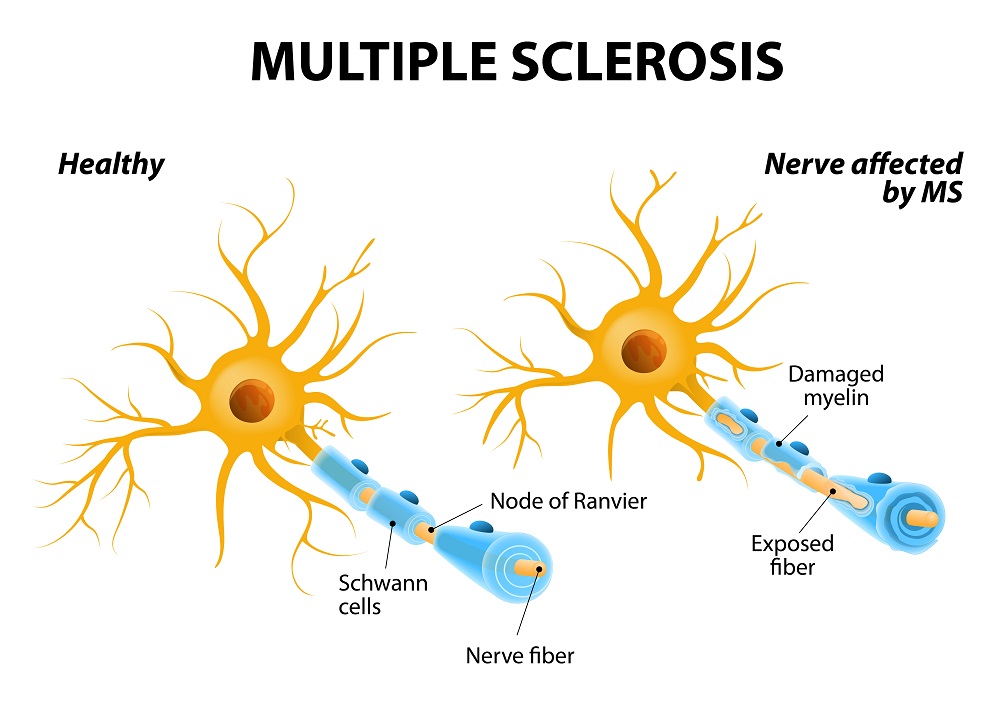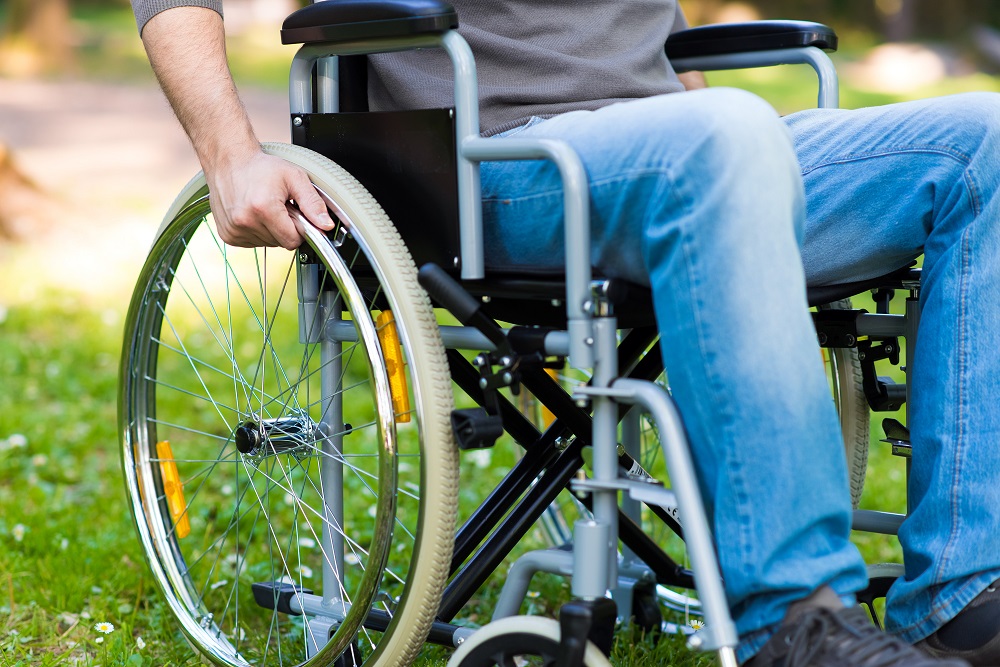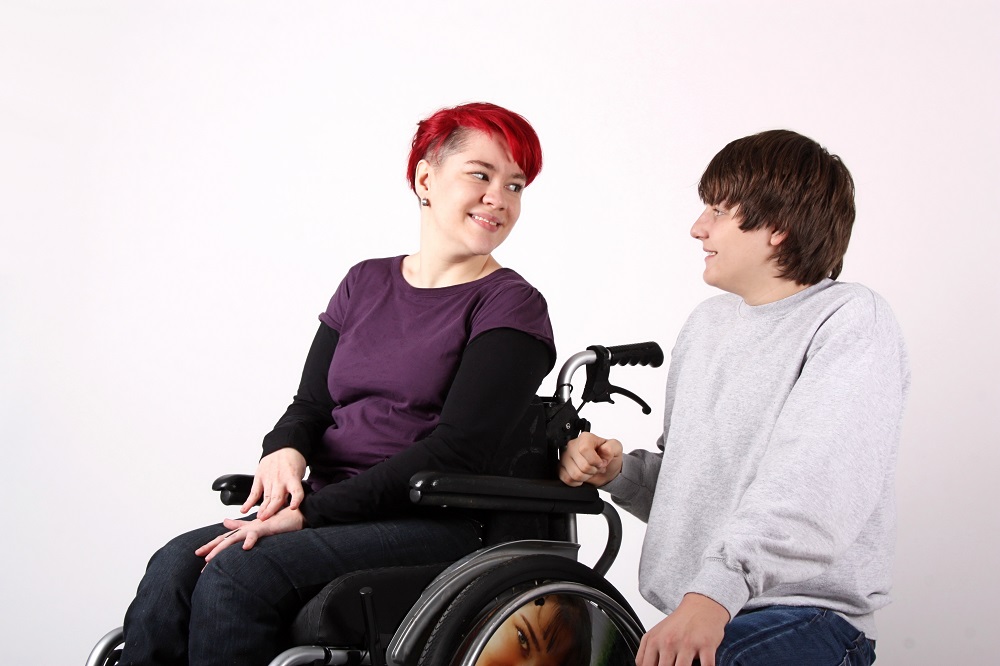
Signs and symptoms of multiple sclerosis depend on the location of affected nerve fibers. Symptoms may include:
- Numbness or weakness in one or more limbs that usually develops on one side of the body at a time, or the legs and trunk
- Partial or complete loss of vision, in one eye at a time
- Pain during eye movement
- Double vision or blurring of vision
- Tingling or pain in body parts
- Electric-shock sensations that appear with neck movements, particularly by bending the neck forward
- Tremor
- Lack of coordination
- Unsteady gait
- Slurred speech
- Fatigue
- Dizziness
- Hearing loss
- Seizures
- Uncontrollable shaking
- Breathing problems
- Trouble swallowing
- Problems with bowel and bladder function
- Problems with sexual function
Scientists don’t know the cause of multiple sclerosis. But they believe it’s an autoimmune disease, in which the immune system of the body attacks its own tissues. The process destroys myelin – the fatty substance that coats and protects nerve fibers in the brain and spinal cord. When myelin is damaged, the messages traveling along that nerve might be slowed or blocked. Although it’s not clear why the disease develops in some people and not others, a combination of factors, e.g. genetics and childhood infections, may play a role.
Patients with MS have a high risk of getting a depression. They may also develop epilepsy, mental changes, e.g. mood swings, forgetfulness, pseudobulbar affect (bouts of uncontrollable crying and laughing), paralysis (especially in the legs) or spasms.
Although there is currently no cure for MS, it’s not a fatal disease. According to the Multiple Sclerosis Foundation (MSF), the patients have essentially the same life expectancy as the general population.
Diagnosis
The neurologist checks the following conditions:
- Reduced nerve function (neurological exam)
- Distortions in the inner eye and response times (eye exam)
In addition, doctors remove a sample of spinal fluid with a long needle (spinal tap). They need these tests to search for damage to the central nervous system in two separate areas that occurred at least one month apart. The tests are also supposed to rule out other conditions.
Treatment
MS cannot be cured, but there are several options to treat the disease. Therapy focuses on speeding recovery from attacks, slowing the progression of multiple sclerosis and managing symptoms, as well as providing good psychological and social support. It’s important to maintain the patient’s quality of life and independence as long as possible. Therefore, therapeutic measures should always be adapted to the patient’s individual needs, in cooperation with specialists.
The treatment of MS is built on three pillars:
1. Acute treatment in case of MS attacks
- Corticosteroids
- Plasma exchange (plasmapheresis)
2. Treatments to modify progression
- Beta interferons
- Glatiramer acetate (Copaxone)
- Dimethyl fumarate (Tecfidera)
- Fingolimod (Gilenya)
- Teriflunomide (Aubagio)
- Natalizumab (Tysabri)
- Mitoxantrone (Novantrone)
3. Treatments for symptoms
- Physical therapy
- Muscle relaxants
- Other medications (e.g. for depression, pain, and bladder or bowel control problems)
Self-care at home
Patients may relieve the symptoms of multiple sclerosis by:
- Relieving stress (massage, meditation, deep breathing, yoga might help)
- Resting a lot
- Exercising on a regular basis (e.g. swimming, walking, stretching, low impact aerobics, stationary bicycling, yoga, tai chi) – depending on the stage of MS
- Avoiding exposure to heat
- Cooling down (e.g. with cooling scarves or vests)
- Eating a balanced diet (low in saturated fat, high in omega-3 fatty acids, vitamin D may be beneficial)
Preventive measures
Multiple sclerosis cannot be prevented. However, the best defense against MS is seeing the doctor immediately after the first warning signs have showed up. This is particularly important if someone in the immediate family has the disorder, as genetics is one of the risk factors for MS.
Recognized MS centers* in Germany »
Schön Klinik (17 locations) »
* Recognized MS centers by „Deutsche Multiple Sklerose Gesellschaft, Bundesverband e. V.“ (German Multiple Sclerosis Society, registered Federal Association)


